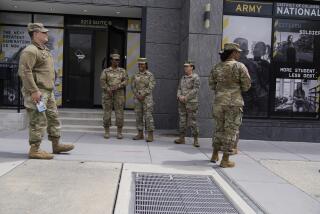Pentagon rift over troop cuts in Iraq aired
President Bush, accepting the recommendation of Army Gen. David H. Petraeus to halt the withdrawal of American troops from Iraq in July, said Thursday that he would give the war commander “all the time he needs” to decide on future troop cuts.
But in a surprising show of public concern about an open-ended U.S. commitment, Defense Secretary Robert M. Gates told a Senate hearing that he hoped to resume troop reductions soon after a “brief” 45-day pause this summer.
Gates’ comments, along with similar testimony from the chairman of the Joint Chiefs of Staff, were in stark contrast to those of Petraeus, who spent two days this week on Capitol Hill telling lawmakers that it could be months before conditions in Iraq permitted further troop withdrawals.
Differences within the Pentagon over the issue have been brewing for months, but rarely have they been aired publicly. Democrats on the Senate Armed Services Committee seized on the contrasts, prompting Gates to acknowledge that there is a difference in the way he and Petraeus view troop levels.
“My view is that [Petraeus] should be in a position at the end of that 45-day period of evaluation and consolidation to make a determination whether a next further drawdown could take place,” Gates said. “One of the benefits of being secretary of Defense, I suppose, is that I’m more allowed to hope than the field commander is.”
U.S. officials are in the process of withdrawing additional units sent last year as part of the troop buildup. Once the last of those units leave, in July, Petraeus will have at least 45 days before contemplating further troop cuts under the recommendation approved by Bush. But Gates and Petraeus appear to differ over how long commanders should take before deciding on further troop withdrawals.
Petraeus has been pressing to keep force levels as high as possible, winning a sympathetic ear from Bush.
In a televised address announcing that he had accepted Petraeus’ recommendation, Bush said he would cut the length of Army tours from 15 months to a year starting with units deployed after Aug. 1. In the address, Bush also set a high bar for troop withdrawals.
“The day will come when Iraq is a stable democracy that helps fight our common enemies and promote our common interests in the Middle East,” Bush said, aiming his comments at U.S. troops and civilians in Iraq. “When that day arrives, you’ll come home with pride in your success and the gratitude of your whole nation.”
But members of the Joint Chiefs of Staff have repeatedly expressed concern that frequent deployments have strained U.S. ground forces and depleted resources needed elsewhere, particularly in Afghanistan. Gates has been sympathetic to them but has mostly mediated differences.
The Pentagon leadership is under new pressure to find additional troops to send to Afghanistan to fulfill a commitment Bush made at a NATO summit last month, a senior Defense official said.
But Pentagon planners will only be able to supply those troops if further cuts in Iraq this year bring the size of the force there below 140,000 troops, or 15 brigades.
“It is everyone’s desire to get below 15,” said the Defense official, who was not authorized to speak publicly on troop levels.
On Capitol Hill, Gates emphasized that all members of the military leadership, including Adm. Michael G. Mullen, the Joint Chiefs chairman, supported Petraeus’ recommendation that there be a 45-day suspension of troop cuts.
But Mullen, testifying with Gates, said that U.S. units could continue to train Iraqi forces and prod the Iraqi government toward political reconciliation while the number of troops was reduced.
“I see no reason why we cannot accomplish these goals while also keeping open the option of an informed drawdown of forces throughout the remainder of this year,” Mullen said.
Mullen spoke with added urgency about Afghanistan, where 31,000 U.S. troops are fighting. In Afghanistan, Mullen said, “we do what we can. But doing what we can in Afghanistan is not doing all that we should.”
The comments by Gates and Mullen set up a potential confrontation this fall, just weeks before the U.S. presidential election. The Pentagon, worried about having enough troops for Afghanistan, may insist on cuts in the Iraq force. But such a stance would clash with Petraeus and other commanders, who want high troop levels through October for Iraq’s provincial elections.
Gates described the cessation of troop withdrawals in July as a “brief pause.” Both Petraeus and Bush avoided using those words.
“There is clearly a disagreement in rhetoric,” said Sen. Carl Levin (D-Mich.), the Senate Armed Services Committee chairman. “Clearly, there is a clash.”
Despite the differences, there was also broad accord among the U.S. political and military leadership during a day of public appearances. Bush, Gates, Mullen and Petraeus all agreed that the 15-month troop buildup had reduced violence and enabled the start of economic redevelopment and political reconciliation.
Bush argued that the buildup had changed the course of the war and revived prospects for success. Those who have argued that further troop reductions would put needed pressure on the Iraqi government to stand on its own are wrong, he said.
“The Iraqis are a proud people,” Bush said at the White House, standing before military veterans and members of his Cabinet. “But they know that they still need our help until they can stand by themselves.”
Mullen, who serves as the president’s chief military advisor, told senators that future political progress depends on the willingness of Iraqi leaders to make difficult decisions. “Our troops can open many doors, but they cannot force Iraqi leaders through them,” he said.
Democratic leaders denounced Bush’s upbeat description, pointing to recent violence and attacks on Baghdad’s heavily fortified Green Zone, where U.S. operations are based.
“The president still doesn’t understand that America’s limited resources cannot support this endless war that he’s gotten us involved in,” said Senate Majority Leader Harry Reid (D-Nev.).
In his address, Bush again warned Iran against training and funding militant Shiite militias. “If Iran makes the wrong choice, America will act to protect our interests and our troops and our Iraqi partners,” Bush said, without specifying possible action.
U.S. officials have accused Iran of contributing to recent violence in Iraq through its support of extremists. The violence has spilled into formerly peaceful Baghdad neighborhoods, including the Shiite stronghold of Sadr City, where militants loyal to cleric Muqtada Sadr have battled U.S. and Iraqi forces for two weeks.
Fighting erupted there again Tuesday, with two U.S. airstrikes to destroy suspected rocket locations. U.S. officials provided no casualty figures, but Iraqi police said seven people were killed and 18 wounded in the strikes.
Separately, the U.S. military announced that an American soldier died earlier this week when his vehicle struck a roadside bomb in central Baghdad. The incident raised American troop deaths to 20 in April. U.S. fatalities have jumped since March 25, the start of an Iraqi-led offensive in Basra.
--
julian.barnes@latimes.com
Times staff writers James Gerstenzang in Washington and Ned Parker and Saif Hameed in Baghdad contributed to this report.
More to Read
Start your day right
Sign up for Essential California for news, features and recommendations from the L.A. Times and beyond in your inbox six days a week.
You may occasionally receive promotional content from the Los Angeles Times.






